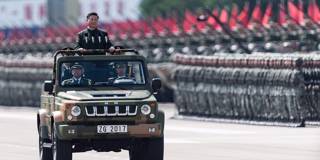Increasingly, it appears that China's president is turning to nationalism as a substitute for economic growth as a source of political legitimacy. And when it comes to generating popular support in China, nothing competes with asserting the mainland’s sovereignty over Taiwan.
NEW YORK – Much of the foreign-policy conversation in the United States over the past two weeks has centered on whether US Speaker of the House Nancy Pelosi ought to have visited Taiwan. Her backers point out that there was precedent for such a visit – a previous speaker and cabinet members had visited Taiwan – and that it is important for officials to underscore the US commitment to Taiwan in the face of increasing Chinese pressure. But critics argued that the trip was ill-timed, because Chinese President Xi Jinping would likely feel a need to respond, lest he appear weak heading into a critical Party Congress this fall. There were also worries that the visit might lead Xi to do more to support Russia’s aggression in Ukraine.
But the focus on Pelosi’s visit is misplaced. The important question is why China responded not just by denouncing the trip, but with import and export bans, cyberattacks, and military exercises that represented a major escalation over anything it had previously done to punish and intimidate Taiwan.
None of this was inevitable. The Chinese leadership had options. It could have ignored or downplayed Pelosi’s visit. What we saw was a reaction – more accurately, an overreaction – of choice. The scale and complexity of the response indicates that it had long been planned, suggesting that if the Pelosi trip had not taken place, some other development would have been cited as a pretext to “justify” China’s actions.

NEW YORK – Much of the foreign-policy conversation in the United States over the past two weeks has centered on whether US Speaker of the House Nancy Pelosi ought to have visited Taiwan. Her backers point out that there was precedent for such a visit – a previous speaker and cabinet members had visited Taiwan – and that it is important for officials to underscore the US commitment to Taiwan in the face of increasing Chinese pressure. But critics argued that the trip was ill-timed, because Chinese President Xi Jinping would likely feel a need to respond, lest he appear weak heading into a critical Party Congress this fall. There were also worries that the visit might lead Xi to do more to support Russia’s aggression in Ukraine.
But the focus on Pelosi’s visit is misplaced. The important question is why China responded not just by denouncing the trip, but with import and export bans, cyberattacks, and military exercises that represented a major escalation over anything it had previously done to punish and intimidate Taiwan.
None of this was inevitable. The Chinese leadership had options. It could have ignored or downplayed Pelosi’s visit. What we saw was a reaction – more accurately, an overreaction – of choice. The scale and complexity of the response indicates that it had long been planned, suggesting that if the Pelosi trip had not taken place, some other development would have been cited as a pretext to “justify” China’s actions.